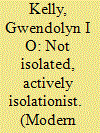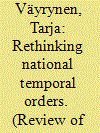|
|
|
Sort Order |
|
|
|
Items / Page
|
|
|
|
|
|
|
| Srl | Item |
| 1 |
ID:
155122


|
|
|
|
|
| Summary/Abstract |
The Nilgiri hill communities have for a long time been the focus of anthropological inquiry, though they have rarely been the focus of historical inquiry that delves more deeply into the past than the colonial period. And, while the fields of history and anthropology have moved beyond tropes of primitive and timeless, our studies of those formerly so-called ‘timeless primitives’ have remained stuck in time. I argue, therefore, for an interdisciplinary modified Subaltern Studies approach, integrating data from anthropology, archaeology, linguistics, and genetics, to develop a longue durée social history of the Nilgiri hills. For the Nilgiri communities, as with other tribal communities, narratives about their past have tended to emphasize their isolation until the modern period. In this article, drawing together data from several disciplines, I argue that the communities of the Nilgiris, especially the Toda, so frequently held up as examples of cultural isolation, were not truly isolated, neither from neighbouring tribal communities, nor from the states and empires of the plains below. I argue that the maintenance of distinctive religious, subsistence, and linguistic practices, despite contact with a wider world, is evidence of an active process of isolationist group formation/maintenance and resistance to other ways of being.
|
|
|
|
|
|
|
|
|
|
|
|
|
|
|
|
| 2 |
ID:
148124


|
|
|
|
|
| Summary/Abstract |
How the past is remembered is fundamental to the production and reproduction of postwar sovereign political power. However, Internation Relations’ (IR) explicit interest in the practices of remembrance, and particularly in time remains a relatively new one. This article seeks to show how Jacques Rancière’s discussion of temporality, subaltern history, and politics – which allows the study of parallel and enmeshing temporal universes – contributes to the IR literature on time. In this view, when speech is acquired by those whose right to speak is not recognised they can produce temporalities that disturb hegemonic representations of time constellations and reorganise the nation’s relationship to its past. The article analyses the moment of Kaisu Lehtimäki’s telling her war story in public, and understands it to be a material and symbolic event that shatters the hegemonic distribution of the Finnish postwar national history and truth.
|
|
|
|
|
|
|
|
|
|
|
|
|
|
|
|
|
|
|
|
|